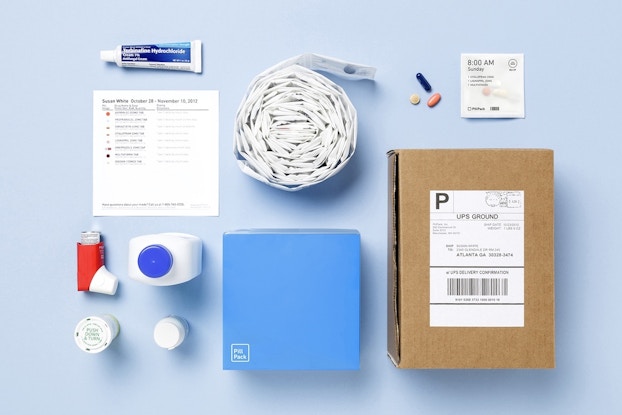
Editor's Note: Since the publication of this story, Amazon acquired PillPack in 2018 for $753 million.
The average American over the age of 65 takes up to seven different prescription medications per day. And 10% of the overall U.S. population take five or more prescription drugs every month, per the CDC. For millions of people, that adds up to a lot of pills to track, and, more importantly, safely take.
PillPack wants to change that. The Somerville, Massachusetts- and Manchester, N.H.-based company aims to make the often complicated traditional medication ordering and taking process a whole lot simpler — and safer.
The innovative startup, co-founded in 2013 by second generation pharmacist TJ Parker and health-tech entrepreneur and engineer Elliot Cohen, is on a mission to “fix pharmacy.” How? By pre-sorting and shipping individualized, single-serve packets of daily prescription meds to people who juggle multiple medicines per day.
“We want to help our customers take their medications, and, ultimately, help them stay healthy,” Parker said in an interview.
Here’s how it works. First, PillPack customers share their prescriptions and insurance coverage with the company through its secure, HIPAA-compliant website. They can also phone or fax prescriptions in.
Next, customers’ prescriptions are transferred to PillPack’s pharmacy and distribution facility. The busy nerve center is located in an 80,000-square-foot, two-story space in Manchester’s historic Waumbec Mill. There, medications are sorted and filled using a precision automated robotic dispensing system. A licensed pharmacist checks each step in the process to ensure accuracy.
Finally, PillPack ships the medications in discreet, unmarked boxes via UPS. Customers are notified when their meds are on the way, tracking numbers included.
New PillPack shipments are delivered every few weeks and contain 14- or 28-day supplies of medication, as well as any non-emergency, as-needed meds, such as inhalers or creams that are requested between shipments.
The idea for PillPack percolated in Parker’s mind for a long time, as he worked alongside his pharmacist father, Leon Parker, delivering pre-filled pill packages to nursing home residents throughout the Granite State. The father-and-son team watched many people struggle to take their medications as prescribed.
Unfortunately, what the Parkers witnessed isn’t unique, with an estimated 50% of all Americans failing to take their prescriptions properly, according to the Mayo Clinic. Medication non-adherence can lead to death, increased morbidity and up to $100 billion spent each year on avoidable hospitalization, the New England Journal of Medicine reports.
Like the Parkers, PillPack co-founder Cohen — whose father battled cancer twice and whose mother operated neighborhood healthcare clinics near his hometown of Davis, California, per Beta Boston — also grew concerned about the issues that slow down and complicate the traditional pharmacy model.
United around modernizing the pharmacy — and enabling people to “take the right meds at the right time, every time” — Parker and Cohen first took the entrepreneurial leap together in the fall of 2012. By Spring 2013, they launched PillPack out of Boulder, Colorado-based accelerator TechStars. They later enlisted the creative services of Palo Alto, California-based design firm IDEO to assist with the startup's inaugural prototype rollout.
Meanwhile, several impressive venture capital infusions rolled in along the way. PillPack has raised a hefty $118 million in funding, with investments from Accel Partners, Atlas Venture, CRV, Founder Collective, Menlo Ventures and Sherpa Ventures.
The ambitious upstart, now licensed to ship prescriptions to consumers in 49 U.S. states, has also quickly grown from a handful employees to more than 200 and growing.
When asked why he and Cohen chose to anchor their company out of the Greater Boston area, Parker — who grew up about a two hours' drive north of Beantown in Concord, N.H. — said that he’s “a little biased,” being that he attended Massachusetts College of Pharmacy and Health Sciences and Massachusetts College of Art and Design.
“Boston is a great city for growing a business,” he said. “It has many of the resources we need to build a world-changing consumer company. With so many colleges, universities and hospitals, it’s uniquely suited as an intersection of design, technology and healthcare. It has a vast talent pool mixed with seasoned folks and fresh, young hungry folks as well.”
Before going into the Rx business together, Parker and Cohen had previously collaborated with one another at the Massachusetts Institute of Technology’s Hacking Medicine at MIT, a weekend forum designed to “inspire and empower the next generation of healthcare entrepreneurs by equipping them with the skills, experience and network connections to hack medicine.”
As for what’s next for PillPack, Parker and Cohen have their sights set on further broadening their customer base.
“We are quite focused on getting PillPack into the hands of as many folks as possible,” Parker said. "There are more than 30 million Americans that take more than five medications a day, and we want to continue to build awareness about our service, as well as build the tools and infrastructure necessary to scale the business.”
CO— aims to bring you inspiration from leading respected experts. However, before making any business decision, you should consult a professional who can advise you based on your individual situation.
CO—is committed to helping you start, run and grow your small business. Learn more about the benefits of small business membership in the U.S. Chamber of Commerce, here.

What can membership do for your business?
Gain tools to stay informed, competitive, and connected by becoming a U.S. Chamber of Commerce member. Membership gives you direct access to expert policy insights, economic updates, and exclusive resources designed to help your business thrive. From behind-the-scenes analysis from D.C. to exclusive discounts and expert support, U.S. Chamber membership helps you navigate change and seize new opportunities.







